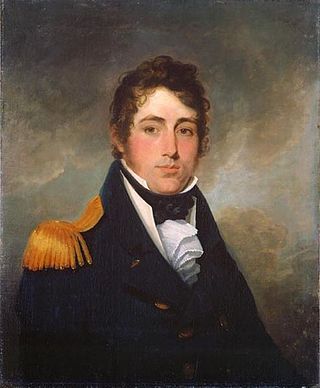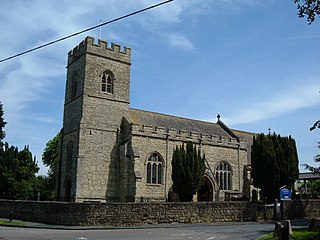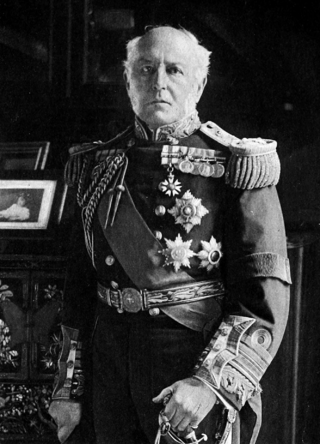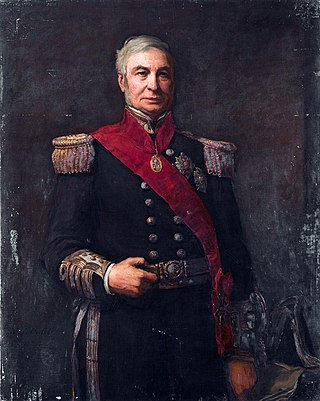
Admiral of the Fleet Sir Provo William Parry Wallis, was a Royal Navy officer. As a junior officer, following the capture of USS Chesapeake by the frigate HMS Shannon during the War of 1812, the wounding of HMS Shannon's captain and the death of her first lieutenant in the action, he served as the temporary captain of HMS Shannon as she returned to Halifax, Nova Scotia, with Chesapeake.

Swanbourne is a village and civil parish in Buckinghamshire, England, two miles east of Winslow and three miles west of Stewkley.

Rear-Admiral John Bythesea was an officer of the Royal Navy. He was an English recipient of the Victoria Cross, the highest and most prestigious award for gallantry in the face of the enemy that can be awarded to British and Commonwealth forces. He was awarded the Victoria Cross for his actions in 1854 during the Crimean War. However, in 1872 he ruined his career when he put his battleship HMS Lord Clyde aground at Pantellaria, resulting in his dismissal from his ship; he was never employed at sea again.

Vice-Admiral Sir Thomas Francis Fremantle, 1st Baron Fremantle, was a British Royal Navy officer and nobleman whose accolades include three separate fleet actions, a close friendship with Horatio Nelson, 1st Viscount Nelson and being granted an Austrian barony. He was the father of Admiral Sir Charles Fremantle, after whom the city Fremantle in Western Australia is named.

Admiral Sir Robert Lambert Baynes was a British Royal Navy admiral who as Commander-in-Chief, Pacific Station prevented the 1859 Pig War from escalating to a major conflict between the United States and the United Kingdom. Baynes joined the Royal Navy in 1810 and served in the Napoleonic Wars and the War of 1812. He took part in the Battle of Navarino in 1827 during the Greek War of Independence. He was promoted to captain in 1828 and commanded the vessels HMS Andromache and HMS Bellerophon and served as one of the senior officers in the Baltic Sea during the Crimean War. In 1857, he was made Commander-in-Chief, Pacific Station.
Admiral Sir James Hanway Plumridge was a British naval officer whose career extended from Trafalgar to the Crimean War, and a Liberal Party Member of Parliament (MP).

Vice Admiral Sir Henry Mangles Denham was a Royal Navy officer who went on to be Commander-in-Chief, Pacific Station.

Admiral Maurice Frederick FitzHardinge Berkeley, 1st Baron FitzHardinge, was a Royal Navy officer. As a junior officer he commanded gunboats on the Tagus, reinforcing the Lines of Torres Vedras, in Autumn 1810 during the Peninsular War and, as a captain, he served on the coast of Syria taking part in the capture of Acre in November 1840 during the Oriental Crisis. He also served as Whig Member of Parliament for Gloucester and became First Naval Lord in the Aberdeen ministry in June 1854 and in that role focussed on manning the fleet and in carrying out reforms and improvements in the food, clothing, and pay of seamen.

Admiral of the Fleet Sir Houston Stewart, was a Royal Navy officer and briefly a Liberal Party Member of Parliament. After serving as a junior officer in the Napoleonic Wars, Stewart became commanding officer of the third-rate HMS Benbow in the Mediterranean Fleet and took part in the bombardment of Acre during the Egyptian–Ottoman War. He went on to be Captain-Superintendent of Woolwich Dockyard and then Controller-General of the Coastguard.
Vice Admiral Joseph Denman was a British naval officer, most noted for his actions against the slave trade as a commander of HMS Wanderer of the West Africa Squadron.

Sir William Robert Mends,, was a British admiral of the Royal Navy, eldest son of Admiral William Bowen Mends and nephew of Captain Robert Mends.
Elizabeth "Betsey" Wynne Fremantle was a British diarist. She was the main author of the extensive Wynne Diaries and wife of Royal Navy officer Thomas Fremantle, a close associate of Nelson.

Vice-Admiral Sir Thomas Herbert, KCB, was a British Royal Navy officer. He served in the Napoleonic Wars, War of 1812, and First Anglo-Chinese War. From 1847 to 1849, he was commodore of the South East Coast of America Station. Herbert served as Member of Parliament for Dartmouth as a Conservative from 1852 to 1857.
Thomas Leeke Massie was an officer of the Royal Navy, who rose to the rank of admiral.

Admiral The Honourable Sir Edmund Robert Fremantle was a Royal Navy officer who served as Commander-in-Chief, Plymouth.

Admiral of the Fleet Sir Alexander Milne, 1st Baronet,, was a Royal Navy officer. As a captain on the North America and West Indies Station he was employed capturing slave-traders and carrying out fishery protection duties. He served as a Junior Naval Lord under both Liberal and Conservative administrations and was put in charge of organising British and French transports during the Crimean War. He became Commander-in-Chief, North America and West Indies Station and in this role he acted with diplomacy, especially in response to the Trent Affair on 8 November 1861 during the American Civil War, when USS San Jacinto, commanded by Union Captain Charles Wilkes, intercepted the British mail packet RMS Trent and removed, as contraband of war, two Confederate diplomats, James Mason and John Slidell. He became First Naval Lord in the third Derby–Disraeli ministry in July 1866 and in this role took advantage of the Government's focus on spending reduction to ask fundamental questions about naval strategy. He again became First Naval Lord in the first Gladstone ministry in November 1872, remaining in office under the second Disraeli ministry and identifying the critical need for trade protection at times of war and demanding new cruisers to protect British merchant shipping.
Vice-Admiral Charles Orlando Bridgeman was a Royal Navy officer who saw active service in the Napoleonic Wars and the Greek War of Independence.

HMS Wanderer was a 16-gun brig-sloop of the Royal Navy. The ship was part of the West Africa Squadron stationed at Sierra Leone.

The Royal Navy Burying Ground is part of the Naval Museum of Halifax and was the Naval Hospital cemetery for the North America and West Indies Station at Halifax, Nova Scotia. It is the oldest military burial ground in Canada. The cemetery has grave markers to those who died while serving at Halifax and were treated at the Naval medical facility or died at sea. Often shipmates and officers had the grave markers erected to mark the deaths of the crew members who died while in the port of Halifax.
Admiral Thomas Le Marchant Gosselin was a British naval officer of the 18th and 19th centuries who received the patronage of senior officers such as Samuel Hood, 1st Viscount Hood and William Cornwallis. Gosselin joined the Royal Navy in 1778 and as a junior officer had extensive service in the American Revolution, including participating in the Battle of the Saintes in April 1782. Promoted to commander in April 1793, Gosselin took part in the Glorious First of June as commander of HMS Kingfisher. He was promoted to post-captain in July 1795 and took command of a variety of ships including most notably HMS Syren, HMS Latona, and HMS Audacious. Gosselin frequently served on blockade duties in the English Channel and on convoy duties to and from the West Indies.













